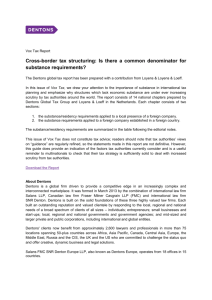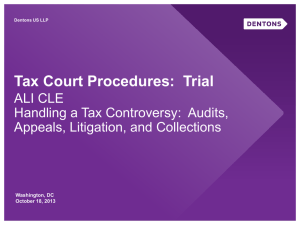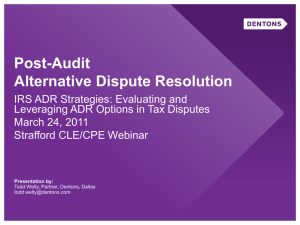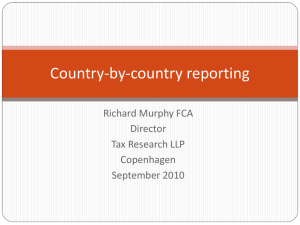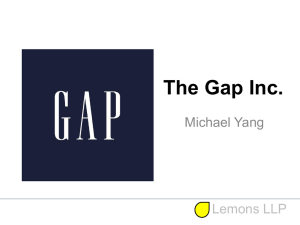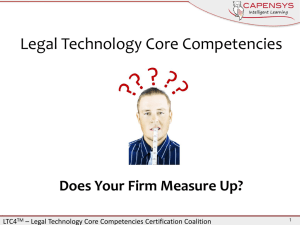International-Reporting-Presentation-MTW
advertisement
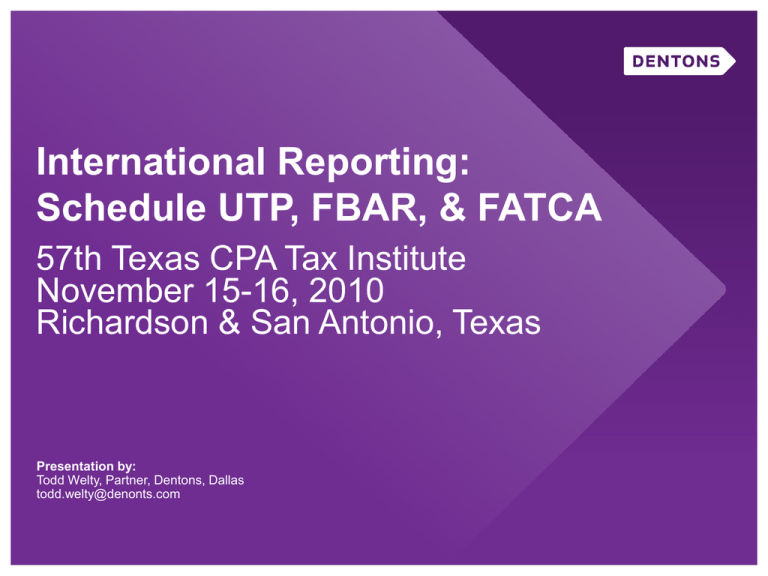
International Reporting: Schedule UTP, FBAR, & FATCA 57th Texas CPA Tax Institute November 15-16, 2010 Richardson & San Antonio, Texas Presentation by: Todd Welty, Partner, Dentons, Dallas todd.welty@denonts.com Locations November 15-16, 2010 Dentons US LLP 2 Offices by list Key Canada United States Europe Central and Eastern Europe l Offices l Calgary Atlanta l Barcelona l Bratislava Associate offices l Edmonton Boston l Berlin l Bucharest Facilities l Montréal l Chicago l Brussels l Budapest u Associate firms l Ottawa l Dallas l Frankfurt l Istanbul l Toronto l Kansas City l Madrid l Prague l Vancouver l Los Angeles l Paris l Warsaw Miami u Zurich New Orleans l New York l Phoenix + Special alliance firms l San Francisco l Short Hills l Silicon Valley l St. Louis l Accra l u Algiers Amman u Bissau u u Bujumbura l Cairo u Cape Town Kuwait City u Casablanca l Manama u Dar Es Salaam l Muscat u u Johannesburg u Kampala u Kigali u Luanda u Lusaka u Maputo u Nairobi u Nouakchott Kyiv u Port Louis l Moscow u Praia l St. Petersburg u u Washington, DC l l Dentons US LLP Middle East Abu Dhabi Asia Pacific l Beijing l Hong Kong Beirut l Shanghai l Doha l Singapore l Dubai Riyadh + Lagos United Kingdom November 15-16, 2010 Africa London Milton Keynes Russia and CIS l Central Asia l Almaty u Ashgabat São Tomé l Baku Tripoli l Tashkent 3 Background The government has prioritized international tax issues: • IRS increased resources to international tax issues (e.g., 2009 voluntary disclosure program, new LB&I division). • DOJ increased prosecutions of civil and criminal tax fraud. • Congress increased the civil penalty for willful violations of FBAR reporting. November 15-16, 2010 Dentons US LLP 4 Outline of Presentation Information exchange is key to IRS strategy: • Schedule UTP for disclosing uncertain tax positions • IRS Voluntary Disclosure Initiative and FBAR reporting • FATCA legislation imposing reporting and withholding requirements on certain financial institutions November 15-16, 2010 Dentons US LLP 5 Schedule UTP • Until recently, taxpayers were required to make disclosures under limited circumstances. • In late 2010, the IRS significantly broadened taxpayer reporting requirements by issuing Schedule UTP to require certain corporations to report uncertain tax positions. November 15-16, 2010 Dentons US LLP 6 Purpose • To “identify potential noncompliance more efficiently and target [IRS] resources more effectively.” • “Our Schedule UTP needs also to be viewed as part of a major restructuring of the relationship with large corporate taxpayers.” • Commissioner Shulman November 15-16, 2010 Dentons US LLP 7 Goals of Schedule UTP • According to Commissioner Shulman, the goals of the reporting are: 1) to create certainty sooner for taxpayers; 2) cut down the time it takes the IRS to find issues and complete an audit; 3) ensure that both the IRS and the taxpayer spend more time discussing the law and less time looking for information; 4) help the IRS prioritize the taxpayers for examination; 5) help the IRS identify and prioritize the issues during audit and for developing further guidance; and 6) obtain key information regarding uncertain positions “without getting into the heads of the taxpayers or their advisors, as it relates to quantifying risk.” November 15-16, 2010 Dentons US LLP 8 Filing Requirements • Schedule UTP requires reporting of U.S. Federal income tax positions taken by certain corporations on the return for which either: 1) the taxpayer (or a related entity) has recorded a reserve in its financial statements with respect to that position, or 2) the taxpayer has not recorded a tax reserve because the taxpayer expects to litigate the position • Applicable to tax years beginning in 2010 • Requires a “concise description of each uncertain tax position” • Must provide the primary Code sections relating to the position • Requires ranking of tax positions November 15-16, 2010 Dentons US LLP 9 Corporations Required to File • Originally, “certain corporations” meant those with assets in excess of $10 million had to file beginning with 2010 tax years • IRS phased-in implementation: • 2010: Corporations with assets in excess of $100 million • 2012: Corporations with assets in excess of $50 million • 2014: Corporations with assets in excess of $10 million • Asset threshold test includes world-wide income. • An affiliated group of corporations filing a consolidated return will file for the group and need not identify the member of the group to which the position relates. November 15-16, 2010 Dentons US LLP 10 IRS Original Proposal Originally proposed more burdensome requirements: • Concise description also required: 1) statement that the position involves an item of income, gain, loss, deduction, or credit against tax; 2) statement whether the position involves a determination of the value of any property or right, or a computation of basis, & 3) rationale for the position and the reasons for determining the position is uncertain. • Calculation of the maximum tax amount for which the taxpayer could be liable if the position were challenged. November 15-16, 2010 Dentons US LLP 11 Comments Received • IRS requested and received numerous comments to the proposed Form: – Criticized the uncertainly surrounding the adequacy of the concise statement, – Requested the Service reduce the level of detail required, – Opposed the additional requirements to the concise description • Privilege issues • Greater burden than an audit – Recommended statement regarding penalties, – Requested the Service exclude certain types of tax positions, – Requested the Service eliminate expectation to litigate requirement. November 15-16, 2010 Dentons US LLP 12 Final Schedule UTP “Concise Description” Requirement • The “concise description of each uncertain tax position” must include: ̶ a description of the relevant facts affecting the tax treatment of the position and ̶ information that reasonably can be expected to apprise the IRS of • the identity of the tax position and • the nature of the issue. November 15-16, 2010 Dentons US LLP 13 Final Schedule UTP “Concise Description” Requirement, cont. • “In most cases, the description should not exceed a few sentences.” • A statement that the concise description is “available upon request” is inadequate. • Need not include “an assessment of the hazards of the tax position or an analysis of the support for or against the tax position.” • Did not incorporate the rationale or the nature of the uncertainly requirements originally proposed. November 15-16, 2010 Dentons US LLP 14 Final Schedule UTP Sample Concise Descriptions • The Service provided three sample concise descriptions and accompanying hypothetical facts in the Schedule Instructions. • One or two sentences describe the transaction and another states the issue. • Final Examples contain less detail than those originally proposed. • Example #11 of the Final Instructions provides: ̶ “The corporation is a member of Venture LLC, which is treated as a U.S. partnership for tax purposes. The corporation received a cash distribution during the year from Venture LLC. The issue is the potential application of section 707(a)(2) to recharacterize the distribution as a sale of a portion of the corporation’s Venture LLC interest.” November 15-16, 2010 Dentons US LLP 15 Final Schedule UTP Administrative Tax Positions • The Final Schedule dropped the reporting of administrative practice tax positions. • This required the corporation to report tax positions for which no reserve was recorded because the corporation determined it was the Service’s administrative practice not to raise the issue in examination. • Concerns about the administration of this requirement outweighed the value of the information. • Service is exploring other ways to assess the impact of these tax positions on overall tax compliance. November 15-16, 2010 Dentons US LLP 16 Final Schedule UTP Ranking Requirement • The Final Schedule dropped the maximum tax adjustment for each position listed. • The calculation was replaced with a ranking requirement: – Taxpayers must rank the positions in the order based on the tax reserve. – Does not require disclosure of the actual amounts of the tax reserve. November 15-16, 2010 Dentons US LLP 17 Final Schedule UTP Ranking Requirement • No specific instructions regarding penalties. • Possibility of opening an examination or making another type of taxpayer contact. • IRS is reviewing the potential applicability of penalties for failing to file. • Possible legislation to impose a specific penalty for failure to file or disclose. November 15-16, 2010 Dentons US LLP 18 Final Schedule UTP Duplicate Reporting • Section 6662 – Treated as if the corporation filed a Form 8275 or 8275-R. – Separate disclosure unnecessary. • Possible coordination with Form 8886. • Schedule M-3, Net Income (Loss) Reconciliation for Corporations. November 15-16, 2010 Dentons US LLP 19 Final Schedule UTP Privilege & Policy of Restraint • Schedule UTP does not affect the policy of restraint. • Shuman: IRS is not seeking legal analysis of risk, but information. • IRS will not seek privileged documents even if a taxpayer disclosed the document to a financial auditor as part of an audit. • IRS reserves the right to assert privilege waiver if the taxpayer has engaged in any activity or taken any action other than providing privileged documents to an independent auditor. • IRS reserves the right to request tax accrual workpapers under IRM 4.10.20.3 when unusual circumstances exist or the taxpayer has claimed the benefits of one or more listed transactions. November 15-16, 2010 Dentons US LLP 20 Remaining Issues Taxpayer Concerns • Uncertainly surrounding the adequacy of the “concise description.” • No guidance for determining an “expectation to litigate.” ̶ No exception for CAP participants. ̶ Gauging the possibility of settlement. • IRS use of the information and how reporting will impact future audits, appeals, amended returns, and other controversy matters with the IRS. • Substantiating uncertain positions with tax preparers and preparer penalties. • Release of information to foreign governments. • Potential impact failure to file has on statute of limitations for tax return and securing a refund. • State filing requirements November 15-16, 2010 Dentons US LLP 21 Other Important Initiatives • CAP: Service is expanding CAP to make it permanent. Guidance is expected to be released shortly. – Three phases: • Pre-CAP: allows taxpayer to become current on audit cycle and provides a defined path to get into CAP. • CAP: resembles existing pilot program. • CAP Maintenance: calls for reduction of resources & taxpayer contact. • Fast Track Appeals – Expanding resources for more fast track cases, allowing every taxpayer the opportunity. – Reduces the cycle time by allowing the examiner to close the case when placed on Fast Track. November 15-16, 2010 Dentons US LLP 22 Voluntary Disclosure Program • IRS encouraged taxpayers to disclose previously undisclosed offshore accounts, file FBARs, and resolve tax • Potentially avoid criminal prosecution • October 15, 2009 deadline & uncertainties for late filers • Penalty structure November 15-16, 2010 Dentons US LLP 23 UPDATE: Commissioner’s Statement • Released Nov. 16, 2010: ̶ Announced the withdrawal of the John Doe Summons in the UBS AG matter. • Attributable to the success of the Service obtaining the account holder information under the August 2009 agreement with Swiss government and UBS. ̶ The Commissioner provided an update on the voluntary disclosure program and the UBS agreement. November 15-16, 2010 Dentons US LLP 24 UPDATE: Commissioner’s Statement • Voluntary Disclosure Program ̶ Approximately 15,000 voluntary disclosures from individuals before the VDP program ended. ̶ Additional 3,000 disclosures after the program closed. ̶ Average of $200,000 in tax collections per case, including back taxes, interest, and penalties. • UBS AG Agreement ̶ IRS has received 4,000 UBS treaty-request accounts thus far. ̶ Anticipates more after the remaining accounts are decided by the Swiss Federal Administrative Court—somewhere close to 7,500. November 15-16, 2010 Dentons US LLP 25 UPDATE: Commissioner’s Statement • IRS is scouring the vast quantity of data received from VDP applicants and other sources. • Information has proved invaluable in corroborating prior leads and developing new leads, involving numerous banks, advisors, and promoters from around the world. • IRS has additional cases and banks in its sights now. “[T]his has never been about one bank or one country.” • Commissioner promised that there was “more to come,” and this was “just the start.” • “[W]e are sending a clear message to taxpayers that we are serious about tax compliance.” “[C]ombating international tax evasion will continue to be a top priority.” November 15-16, 2010 Dentons US LLP 26 FATCA • Foreign Account Tax Compliance Act (FATCA): included in the Hiring Incentives to Restore Employment Act of 2010 (HIRE) (enacted Mar. 18, 2010), codified at 26 U.S.C. §§ 1471-1474. • Shulman characterized FATCA as the “most important international information reporting legislation enacted in a generation.” • FATCA impacts investors, foreign financial institutions, investment and mutual funds, American expatriates, and issuers of non-publicly traded debt and equity. November 15-16, 2010 Dentons US LLP 27 Purpose • Prevent the abuse of rules U.S. tax evaders on U.S.-source investment income through accounts with financial institutions located in tax havens and increase transparency with respect to reporting and withholding. • Shulman: FATCA provided the agency with the tools to crack down on U.S. persons “hiding assets overseas” by: ̶ (1) increasing information reporting by U.S. persons with offshore assets through imposition of stiff penalties for failure to comply; ̶ (2) requiring foreign financial institutions to disclose information regarding their U.S. investors or face increased withholding on their U.S. income and gains; and ̶ (3) ramping up the stakes for foreign financial institutions that have to agree to disclose U.S. investors to the IRS or feel the pain of a substantial new withholding tax on U.S. income and gains. November 15-16, 2010 Dentons US LLP 28 Key Provision: Withholding • A “withholding agent” must withhold 30% from any “withholdable payment” to a “foreign financial institution” (“FFI”) and certain “nonfinancial foreign entities” (“NFFEs”). • These requirements also apply to each FFI that is a member of the same “expanded affiliated group” as the FFI. November 15-16, 2010 Dentons US LLP 29 Definitions • A “withholding agent” = person having the control, receipt, custody, disposal or payment of any withholdable payment. • A “withholdable payment” = payment of U.S.-source fixed or determinable annual or periodical (FDAP) income (e.g., interest, dividends, and rents), and any gross proceeds from the sale or disposition of property which can produce U.S.-source interest or dividends, not effectively connected with the conduct of a U.S. trade or business. • “FFI”= any “financial institution” that is neither a U.S. person nor organized under the laws of a US possession. ̶ A “financial institution” = entity that accepts deposits in the ordinary course of a banking or similar business; as a substantial portion of its business, holds financial assets for the account of others; or is engaged primarily in the business of investing, reinvesting, or trading in securities, partnership interests, commodities, or interests therein. November 15-16, 2010 Dentons US LLP 30 Definitions, cont. • An “expanded affiliated group”= Code § 1504(a) affiliated group of corporations, but connected by stock ownership of more than 50% by vote and value, and including Code § 801 insurance companies and foreign corporations. ̶ Any non-corporate entity is considered a member of the expanded affiliate group if any member of the group holds, directly or indirectly, more than 50% of the value of the interests in that non-corporate entity. November 15-16, 2010 Dentons US LLP 31 Exception to Withholding Secretary Agreement • The general rule of section 1471 is inapplicable when the FFI has entered into an agreement with the Secretary under which the FFI agreed to comply with certain reporting and withholding requirements (“Secretary Agreement”). • FFIs with a Secretary Agreement are “Qualified-FFIs” (QFFIs). November 15-16, 2010 Dentons US LLP 32 Exception to Withholding Obligations Under the Agreement The FFI must agree to: • Obtain information • Verification and due diligence • Annual reporting • Comply with requests for additional information • Withhold 30% from any passthrough payment • Obtain a waiver November 15-16, 2010 Dentons US LLP 33 Exception to Withholding Annual Reporting under the Agreement • In respect of U.S. owned accounts, the following must be reported annually: – Name, address, and TIN of each account holder that is a specified U.S. person – Name, address, and TIN of each substantial U.S. owner of any account holder that is a U.S. owned foreign entity – Account number – Account balance or value – Gross receipts and gross withdrawals or payments from the account. November 15-16, 2010 Dentons US LLP 34 Withholding Regime Before FATCA • Prior information reporting and withholding rules were difficult to enforce. • FFIs acting as intermediaries were generally required to provide withholding agents with documentation establishing each account holder’s exemption from withholding or eligibility for a reduced withholding rate (e.g., IRS Form W-9 or W-8). • FFIs with reporting and withholding agreements were not required to provide documentation to the withholding agent if it could determine for itself and certify that the account holder was exempt or otherwise ineligible for a reduced rate. November 15-16, 2010 Dentons US LLP 35 Effective Dates • Payments made after December 31, 2012. • No amount is required to be deducted or withheld under FATCA from any payment under, or from the gross proceeds on any disposition of, an obligation outstanding on March 18, 2012. – Applies to obligations issued only after March 18, 2012. November 15-16, 2010 Dentons US LLP 36 Withholding Payments to NFFEs General Rule • A withholding agent must withhold a tax equal to 30% of any withholdable payment to a Non-Foreign Financial Entity (“NFFE”) where the beneficial owner of the payment is a NFFE. November 15-16, 2010 Dentons US LLP 37 Withholding Payments to NFFEs Exceptions • The general rule does not apply if the NFFE provides withholding agent with: – (1) the name, address, and TIN of each substantial U.S. owner of the NFFE, or – (2) a certification that the NFFE does not have a substantial U.S. owner. November 15-16, 2010 Dentons US LLP 38 Withholding Payments to NFFIs Exceptions, cont. • The general rule does not apply to: – Any payment of which the beneficial owner is: • • • • • • a corporation whose stock is regularly traded on an established securities market; an entity organized under the laws of a U.S. possession & wholly owned by its bona fide resident(s); a foreign government; an international organization; a foreign central bank of issue; or any other class of persons identified by the Secretary as posing a low risk of tax evasion. – Any class of payments identified by the Secretary as posing a low risk of tax evasion. November 15-16, 2010 Dentons US LLP 39 Technical Overview Excerpted from a recent presentation by: Michael D. Shepard November 15-16, 2010 Dentons US LLP 40 Bank Example Excerpted from a recent presentation by: Michael D. Shepard November 15-16, 2010 Dentons US LLP 41 Original Proposal Material Advisor Provision • Final FATCA eliminated a provision required certain material advisors on a foreign entity transaction to disclose the transaction. • ‘Material advisor' = any person who provided material aid, assistance, or advice with respect to carrying out one or more foreign entity transactions and who directly or indirectly derived gross income in excess of $100,000 for providing the aid, assistance, or advice during the calendar year. • Penalty for failing to file: equal to the greater of $10,000 or 50% of the fee the advisor earned for providing assistance, i.e., minimum $50,000. November 15-16, 2010 Dentons US LLP 42 Original Proposal Material Advisor Provision: Issues • Might appear in future legislation. • Implicates ethical issues. • Implicates attorney-client privilege and/or work-product doctrine. • Practical problems for advisors who do not have the information (e.g., advisors who cannot identity all parties involved). November 15-16, 2010 Dentons US LLP 43 International Influence • Foreign countries emulating FATCA – E.g. EU proposed Alternative Investment Fund Managers Directive (AIFM), Apr. 2009. November 15-16, 2010 Dentons US LLP 44 Challenges • FFIs, NFFEs, and U.S. withholding agents face increased burdens and costs associated with U.S. investment, particularly for small institutions in small jurisdictions. • IRS faces increased administrative burden. – Refunds and credits given for overwithheld amounts. November 15-16, 2010 Dentons US LLP 45 Thank you Dentons US LLP 2000 McKinney Avenue Suite 1900 Dallas, TX 75201 USA Dentons counsel drafted this paper for a specific event which occurred in the past. As such, it reflects the state of the law at the time it was drafted, and is not necessarily a reflection of current developments. For an update on this topic, please contact the editors of USTaxDisputes.com. IRS Circular 230: We inform you that any US federal tax analysis contained an any blog post, email, attachment, or other writing (including any attachments), unless specifically stated otherwise, is not intended or written to be used, and cannot be used, for the purpose of (i) avoiding penalties under the Internal Revenue Code or (ii) promoting, marketing or recommending any transaction or matter addressed herein to another party. © 2013 Dentons Dentons is an international legal practice providing client services worldwide through its member firms and affiliates. This publication is not designed to provide legal or other advice and you should not take, or refrain from taking, action based on its content. Please see dentons.com for Legal Notices.
